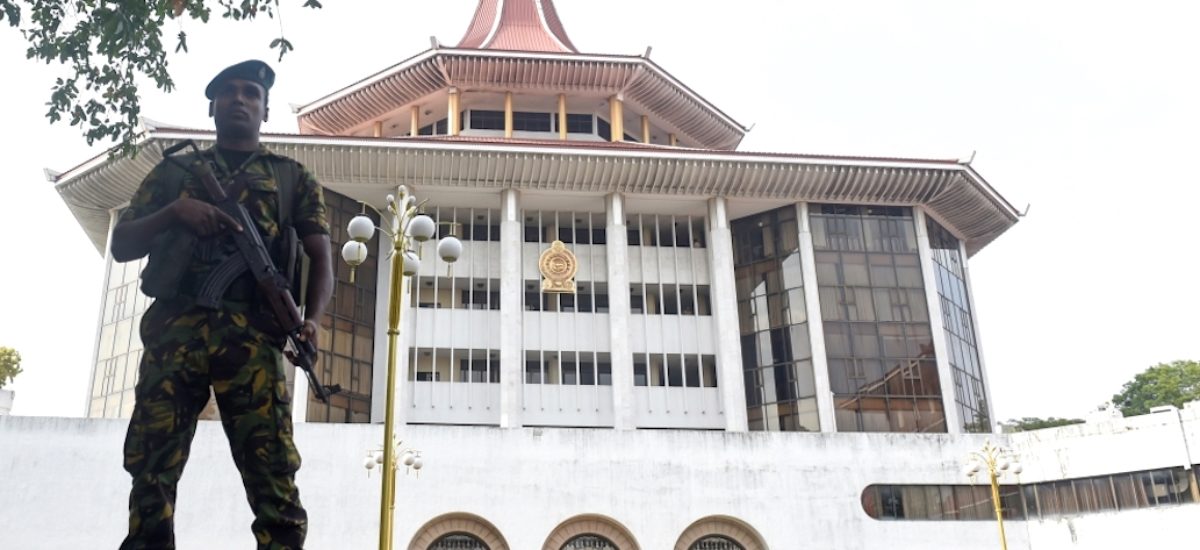Photo courtesy of Al Jazeera
The onset of the bi-annual sessions of the United Nations Human Rights Council (UNHRC), in which Sri Lanka features prominently on the agenda through UNHRC Resolution 46/1, contributes to several local activities. It results in an increased public debate about the state of the nation’s human rights situation, witnesses a hand-picked team from the Attorney General’s Department going to Geneva as the government’s defense attorneys and a flurry of activities – currently completely inconsequential -coordinated by the Ministry of Foreign Affairs to assure the world that the state of human rights in Sri Lanka is not as bad as it is made out to be.
This brief commentary seeks to contribute to the public debate about human rights in the context of one of the entrenched, inalienable features of our republican constitution that sovereignty lies with and is riposte with the people of Sri Lanka. Article 3 of the 1978 Constitution states “In the Republic of Sri Lanka sovereignty is in the People and is inalienable. Sovereignty includes the powers of government, fundamental rights and the franchise”. We will look at the arguments about the inalienable fundamental rights of the people and in practice of persons, in the context where the state and/or elements of the state, rogue or otherwise, are alleged to be complicit or instrumental in violating them.
Firstly, the state faced protracted decades of civil war preceded and interspersed with two armed insurrections that led to the country’s governance under emergency rule, regulations that superseded the constitution. During the conflict period, there was a tacit social compact, understandably so, that the state, facing an armed rebellion, needed to curtail the personal liberty of citizens. This social compact was aided by the absolute brutality of the armed opponents of the state, even against the very constituency it claimed to represent. The LTTE was most vicious on the Tamil people, their children conscripted and their traditional political leaders assassinated while the JVP in the South was murderous in their rebellion, their nadir being assaults on the families of military personnel. The real issue is that post war since 2009, there has been no significant improvement in Sri Lanka’s human rights situation or indeed any meaningful post war reconciliation as recommended by the government’s own Lessons Learnt and Reconciliation Commission (LLRC). Sri Lankans have not received a post war peace dividend, either economic, social or political.
Ten years after the war, when the expectations of a peace dividend were increasing, came the devastating Easter Sunday bombings in April 2009. The answer by the entrenched establishment if not the deep state (Sonic/Sonic) was that we are again under threat, this time from yet another internal enemy with external connections. How much credibility that claim holds just two years after it was made is perhaps best denoted by the fact that Cardinal Malcom Ranjith is this week at meetings with Pope Francis, en route to Geneva, where in both the Vatican and in Geneva as a high level representative of the victims of the Easter Sunday attacks, Cardinal Ranjith will internationally articulate what he and Catholic church spokesmen have decried locally – the absolute lack of progress by the state authorities in identifying and holding to account the mastermind(s) or conspirators of the attacks given the increasing consensus that the trigger pullers pulverized in their own blasts were clearly not the mastermind(s).
On the contrary the state, armed with the PTA, for public safety and security has arrested lawyer Hejaz Hizbullah, poet Ahnaf Jazeem, government medical officer Dr. Shafi Shabdeen, activist Shehan Malaka and attempted the arrest of MP Harin Fernando and Father Cyril Gamini in the latter two cases stopped from doing so by the Supreme Court. In all honesty, the public security threat perception from Mr. Fernando and Father Cyril Gamini is rather low and if the argument is that their actions are a violation of the law and the law in question is the PTA, therein lies a serious problem. The PTA is bad in law and worse in practice. Current Court of Appeal Justice Meneka Wijesundara in a recent judgement noted “…four decades have past and the PTA has strayed from its historical context. The PTA, if in its application and implementation, creates a vicious cycle of abuse, the very purpose of the statute will be defeated”. The PTA, a temporary provision brought in by an arrogant presidency, does not conform with Sri Lanka’s international human rights obligations. There is no argument about that. Its most problematic features are the admissibility as evidence of “confessions” made to a police officer and a completely vague definition of terrorism that makes all political dissenters of the government, terrorists. A strange construct in a democratic republic of a sovereign people.
The safety, security and well-being of all Sri Lankans is better served when the state is required and the judiciary enforces the protection and promotion of people’s inalienable fundamental rights and freedoms. In the first decade after the end of the war and two years after the Easter Sunday attacks, emerging issues, not just in Geneva but also in Sri Lanka, are – besides the repeal or reform of the PTA – the independence of the Attorney General’s Department, parliamentary oversight of the state’s intelligence services and de-politicization of the nation’s police force.


